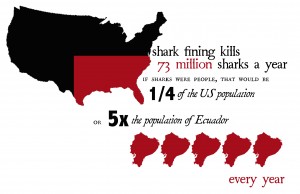Extinguishing Extinction: Ending the Demand for Shark Fins
Aug 8th, 2014 | By admin | Category: Consumption and WasteBy Suzanne York, www.howmany.org
All across the planet, species are at risk, due to humankind’s voracious appetite for practically every natural “resource.”
The bounty of the oceans, for example, is being decimated at an unprecedented rate, and fish stocks are near collapse.Unfortunately, some of what people (or industrial trawlers) catch is completely wasted for one particular part. Like the ivory tusk of an elephant or rhino, sharks are prized for their fins, which are cut off and kept and the rest of the shark discarded to the bottom of the ocean, still alive.
China is the biggest market for shark fins. The rising affluence of Chinese consumers has caused demand to surge, leading to overfishing and the killing of sharks for their appendages. Shark fin soup is a cultural dish in China, and the fin is considered a symbol of wealth.
Given the stark reality for sharks, reducing consumption in China must be a global priority – an estimated 100 million sharks are killed annually, with up to 73 million sharks slaughtered for their fins. Some shark populations have declined by up to 98 percent in the last 15 years.
The international conservation organization WildAid has been working to reduce consumption of shark fins. This week it released a report of its analysis of demand for shark fin and found that sales of shark fins have fallen from 50-70 percent. The decline is being attributed to aggressive public awareness campaigns, changing attitudes of youth, and a government crackdown on the soup, which is now banned at official banquets in mainland China and Hong Kong.
WildAid’s data found that 85 percent of Chinese consumers surveyed online said they gave up shark fin soup within the past 3 years. Two-thirds of these respondents cited awareness campaigns as the reason, while 28.2 percent cited the government banquet ban as the motivation to stop eating fins.
Peter Knights, executive director of WildAid, said “Demand reduction can be very effective. The more people learn about the consequences of eating shark fin soup, the less they want to participate in the trade.”
Oceana, which advocates for ocean conservation, explains that as predators at the top of the food chain, sharks play a vital role in maintaining the health of marine ecosystems, serving as an indicator of ocean health. Many people are unaware that sharks are long-lived and produce very few young, making them extremely vulnerable to overfishing. According to the International Union for Conservation of Nature (IUCN), 25 percent of shark species are threatened with extinction.
IUCN states that sharks (and rays) make up one of the earth’s oldest and most ecologically diverse groups of animals on earth and they are at substantially higher risk for extinction than most other groups of vertebrates.
The greatest threat to sharks and rays is overexploitation. Another major threat for many of these species is habitat loss and/or degradation. The impact of humans is felt far and wide.
Finning is banned in roughly 70 countries and by regional fishery bodies, but most enforcement standards are weak.
Watch a public service announcement by Yao Ming on banning shark fins:
According to WildAid, this ad (and others) is having an impact: of 20 Beijing restaurant representatives interviewed in a study to be published in the journal Conservation and Society, 19 reported a significant decline in shark fin consumption. All agreed that WildAid’s PSAs featuring Yao Ming had “definitely raised awareness among customers.”
Sharks have been around for over 400 million years. But they may not withstand the current onslaught. Humans wipe out species at our own risk. Driving a species to extinction – especially a predator as critical as sharks – will upset the delicate balance of the ecosystem, with unknown consequences.
Perhaps the younger generation will put an end to some of China’s cultural “delicacies,” which include endangered tiger and bear parts. A 42-year-old a pharmaceutical industry worker in Beijing, talking about shark fins, said “I tried it once and didn’t like it. And it kills the animal. I think old people like this food more than young people.”
Will demand for fins go out of style in time to save sharks? Only time will tell.
Go here to sign a petition calling on world leaders to ensure the conservation and protection of sharks and to eliminate the sale of shark fins.
Suzanne York is a senior writer with the Institute for Population Studies.



